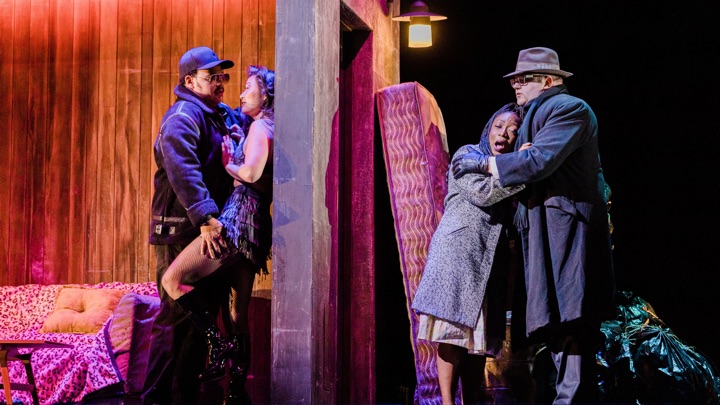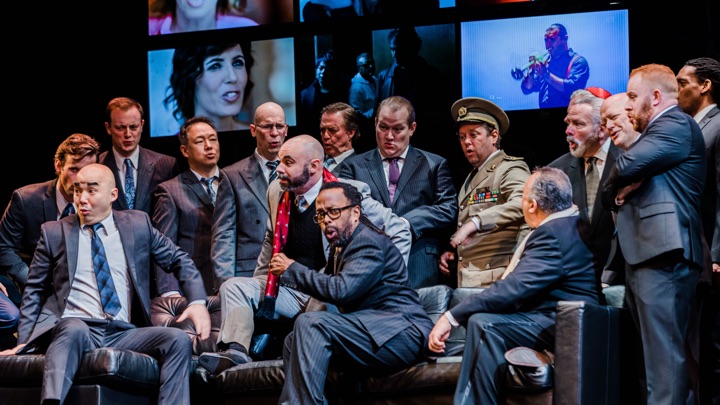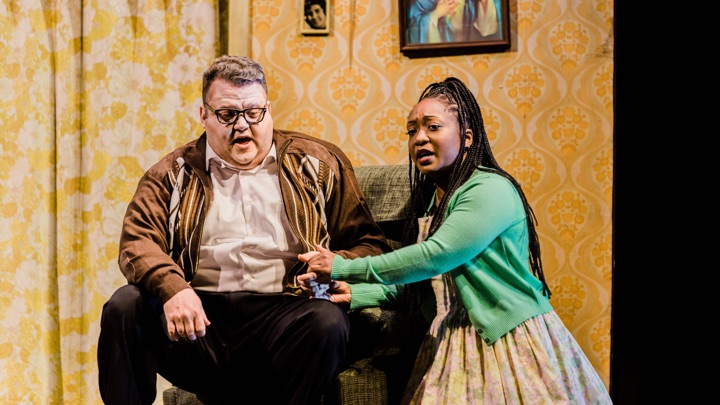

Not that the company had gone dark or even slowed down during COVID. On the contrary, they’ve been a benchmark for others, offering streaming programs on their own channel (including David Little’s Soldier Songs, nominated for the 2022 Best Opera Recording Grammy), as well as some in-person events both out- and indoors—including Oedipus Rex + Lilacs at the Kimmel Center several months ago.
Still, there’s nothing quite like opera in a grand opera house, and the size, scale, and acoustics of the Academy really suit Opera Philadelphia. Their return came in the form of a beloved classic—Rigoletto—and the collective audience sigh of joy that greeted the somber but punchy opening chords signaled success.
That success largely reinforced itself throughout the evening with a production that offered much of what the company does best.
Let’s start with the production—by director Lindy Hume, imported from New Zealand Opera and staged here by Daniel Pelzig—which resets the story in a contemporary milieu.
It was fascinating to see this just days after the Met’s new Lucia di Lammermoor. That was likewise updated—and, I think, for the same purpose: to interrogate the opera’s central themes in the light of contemporary social values.
For Lucia, that meant moving the action to a Midwest devastated by drug addiction. Here, Rigoletto is reset in a contemporary kingdom that looks more like a corporate or political boardroom—but which also puts it under a current lens more sensitive to the deplorable theme of sexual assault by powerful men against vulnerable females. Indeed, a number of recent Rigoletto productions have updated and transposed settings for similar reasons.
I found Hume’s production visually strong and at times dramatically compelling, particularly in its extremes. On one end, we have the grand Ducal palace as a kind of sybaritic playground for rich middle-aged roués; on the other, a seedy bar we might find on a local pier, where Sparafucile (estimable bass Wei Wu) and a particularly brassy Maddalena (mezzo Kristen Choi, throwing herself into the show with astonishing brio) hold sway.
In one of the show’s most effective design touches (Richard Roberts did the sets and costumes), the ghostly frame of the palace is suspended above the action for all the other scenes, underscoring the metaphor of inescapability. But some of the scenes work better than others (Gilda’s abduction, awkwardly staged, didn’t register as it should), and more generally the opera’s component parts didn’t always work together.
The musical values were more consistent—particularly, a superb performance by baritone Anthony Clark Evans as Rigoletto. His luscious baritone is more lyrical than one often hears in the title role, and his physical acting is tightly contained and even minimal. But I’ve rarely if ever heard a Rigoletto who was so scrupulous about musical values, making all his points through truly singing, and binding it all into a legato line. It’s not the most voluminous and roaring Rigoletto—but it’s one of the most affecting and beautiful I’ve heard in years.
He was well-paired here vocally with the Gilda of Raven McMillon, who brought an often exquisitely lovely and very girlish timbre to the music, and executed the passagework with taste and style. She was less strong on the text, which wasn’t always clear or marked by emphasis on individual words—I also think a warmer timbre ultimately works better for Gilda. (But McMillion ought to be on every opera house’s short list for Gretel: she’s ideal in every way!)
Joshua Blue received cheers for “La donna è mobile,” which was clearly meant as approval of his ringing lyric tenor rather than an endorsement of the Duke’s toxic pronouncements. Indeed, this is a voice of exceptional ring and excitement, particularly at the top
I wished that Blue had made more of the grace notes and dynamic shadings—the character is crude, but his music is anything but. Responsibility for some of this also lies with conductor Corrado Rovaris, whose signature sense of impetus—often welcome—went too far here from time to time, as in a “Si, vendetta” that was too fast for the little gruppetti to be audible.
Orchestra and chorus did fine work, and there were notable supporting performances especially by Lauren Decker (Giovanna), Ben Wager (Monterone), and Julius Ahn (Borsa) and Robert Mellon (Marullo).
Rigoletto closes Opera Philadelphia’s 2021-22 season, but September promises the beginning of the next one with (drumroll, please) a return of Festival O. Personally, I can’t wait. Welcome home, Opera Philly!
Photos: Dominic M. Mercier



























Comments